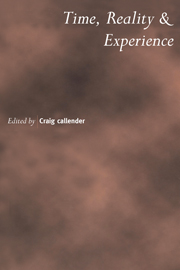Book contents
- Frontmatter
- Contents
- Preface
- Notes on Contributors
- When Time Gets Off Track
- Burbury's Last Case: The Mystery of the Entropic Arrow
- Zeno's Arrow and the Significance of the Present
- Presentism, Ontology and Temporal Experience
- A Presentist's Refutation of Mellor's McTaggart
- Time and Degrees of Existence: A Theory of ‘Degree Presentism’
- McTaggart and the Truth about Time
- On Absolute Becoming and the Myth of Passage
- Time Travel and Modern Physics
- Freedom from the Inside Out
- On Stages, Worms and Relativity
- On Becoming, Cosmic Time and Rotating Universes
- How Relativity Contradicts Presentism
- Can Physics Coherently Deny the Reality of Time?
- Rememberances, Mementos, and Time-Capsules
Time and Degrees of Existence: A Theory of ‘Degree Presentism’
Published online by Cambridge University Press: 05 May 2010
- Frontmatter
- Contents
- Preface
- Notes on Contributors
- When Time Gets Off Track
- Burbury's Last Case: The Mystery of the Entropic Arrow
- Zeno's Arrow and the Significance of the Present
- Presentism, Ontology and Temporal Experience
- A Presentist's Refutation of Mellor's McTaggart
- Time and Degrees of Existence: A Theory of ‘Degree Presentism’
- McTaggart and the Truth about Time
- On Absolute Becoming and the Myth of Passage
- Time Travel and Modern Physics
- Freedom from the Inside Out
- On Stages, Worms and Relativity
- On Becoming, Cosmic Time and Rotating Universes
- How Relativity Contradicts Presentism
- Can Physics Coherently Deny the Reality of Time?
- Rememberances, Mementos, and Time-Capsules
Summary
Introduction
It seems intuitively obvious that what I am doing right now is more real than what I did just one second ago, and it seems intuitively obvious that what I did just one second ago is more real than what I did forty years ago. And yet, remarkably, every philosopher of time today, except for the author, denies this obvious fact about reality. What went wrong? How could philosophers get so far away from what is the most experientially evident fact about reality?
The concept of a degree of existence (of being more or less real) went out of fashion with the rise of analytic philosophy early in the 20th century, specifically, with Russell's 1905 article ‘On Denoting’, for in 1904 and earlier years he and G. E. Moore held a sort of Meinongian theory of degrees of existence (subsistence and existence are distinguished, with existence being a higher degree of being than subsistence). Early work by Frege also rejected the notion of degreed existence and implied that existence is an all or nothing affair; either something exists or it does not exist, and it makes no sense to talk about it existing to some degree.
Most (but not all) philosophers from Plato to Meinong have held doctrines of degrees of existence. Unfortunately, however, they also denied this obvious temporal fact about reality, for they explained degrees of reality in other ways than the way we know it (as being more or less distant from the present).
- Type
- Chapter
- Information
- Time, Reality and Experience , pp. 119 - 136Publisher: Cambridge University PressPrint publication year: 2002
- 21
- Cited by



